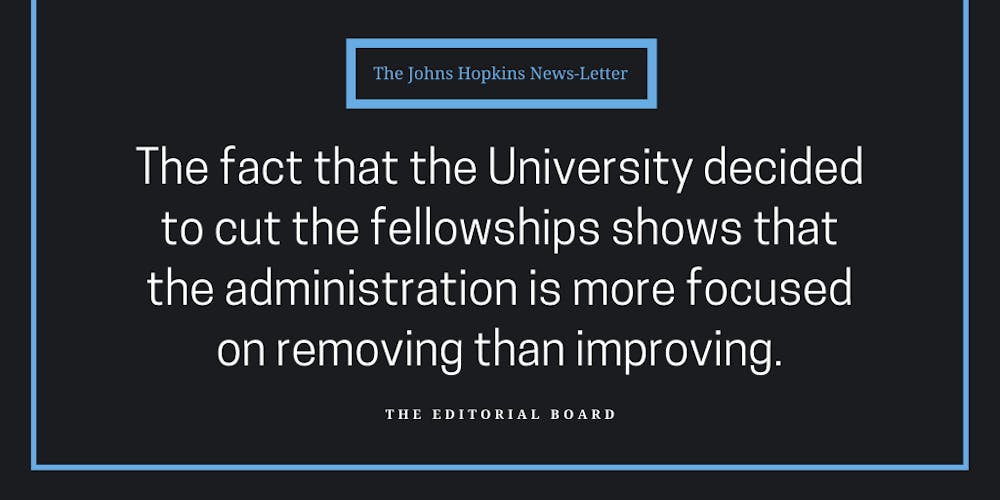Since 1998, the Program of Women, Gender, and Sexuality (WGS) has given students and faculty the space they need to engage with interdiscplinary feminist and queer scholarship — scholarship that has long been overlooked and undervalued.
One of the valuable resources the program offered was the WGS Teaching Fellowships. WGS has offered six of these fellowships every year to graduate students so that they could teach undergraduate courses in the WGS program that were popular and well-received among students.
When the University announced its decision to end the WGS Teaching Fellowships in early November, we were disappointed and confused. The end of the fellowship means the removal of five courses each year that the program offers as part of the WGS minor.
The University did not offer explanations in their initial announcement. Instead, it hosted the WGS town hall only after WGS fellows protested the end of the fellowships with an open letter and petition that now has over 600 signatures.
We’re also concerned by the University’s failure to consult those involved in the program. According to Matthew Roller, the Vice Dean for Graduate Education and Centers and Programs, the WGS co-directors and their faculty advisory board came to the decision to end the fellowships after several years of discussion. However, Roller stated that he doesn’t know whether or not students were involved in these conversations. In the open letter, students claim that Hopkins did not consult any WGS teaching fellows before making the decision.
We understand that the WGS Teaching Fellowships are not perfect. Roller explained in an email to The News-Letter that they did not provide a high enough stipend and that they do not come with tuition remission or health insurance. He hopes students interested in the WGS Teaching Fellowship will now apply to the Dean’s Teaching Fellowship (DTF) instead. The DTF is open to all graduate students, and according to Roller, not enough have been applying for it. Through a DTF, graduate students may be able to teach the same classes they would under the WGS Teaching Fellowships and receive more financial compensation and better health benefits.
Nevertheless, we are still troubled by how the WGS Teaching Fellowships ended so suddenly, with little explanation from the University and little to no consultation with the student body. The sudden end of the fellowships indicates a lack of communication and transparency from the University that is disappointing.
Graduate students deserve to be a part of the conversation. At the very least, they deserve to know in advance why a potentially crucial part of their research and experience here at Hopkins may no longer be available.
The cancellation of the fellowships also represents a symbolic loss to the University at large. The cancellation indicates that once again, Hopkins has chosen to ignore student demand for more diverse course offerings.
Hopkins does not devote enough attention or resources to WGS, especially in comparison to our peer institutions. It’s true that Hopkins is not the only university that does not offer a BA in women and gender studies. However, seven of the eight Ivies and comparable schools such as Massachusetts Institute of Technology, the University of Chicago and Northwestern offer these studies as majors.
As one signator on the WGS petition commented, “It’s appalling how behind the university is generally on this topic compared to its peers, an indication of a clear lack of inclusivity.” We wonder why the University chose to further remove resources from the program as opposed to offering more constructive solutions.
Hopkins claims that it recognizes the importance of diversity in the classroom. Indeed, it has made an effort to hire more female professors, and has outlined plans to expand support for cross-disciplinary programs, such as the Center for Africana Studies, Islamic Studies, Jewish Studies and WGS.
This is commendable. However, the cancellation of the WGS fellowships does not comport with these goals. If the University were truly committed to expanding support to these cross-disciplinary academic programs and promoting diversity in the classroom, it would build on existing opportunities such as the WGS Teaching Fellowships.
Roller said that one motive for ending the fellowships was that other programs and departments did not offer comparable opportunities. However, why not create these opportunities rather than get rid of WGS fellowships?
The fact that the University decided to cut the fellowships shows that the administration is more focused on removing than improving. Opting immediately for the program’s cancelation indicates that the University undervalues the importance and impact that fellowships funding courses in the program of Women, Gender, and Sexuality could potentially have.
We hope that this does not become a trend. We hope that in the future, the University will consult with students when making significant changes to the programs and departments of which they are a part. We hope that the administration will work harder to constructively build on resources like the WGS fellowships, instead of simply taking them away. And we hope in the future that the University will keep its promise to expand cross-disciplinary, historically underfunded programs. The only way to truly support diversity at Hopkins is by creating more opportunities, not by shutting down the few that exist.

















